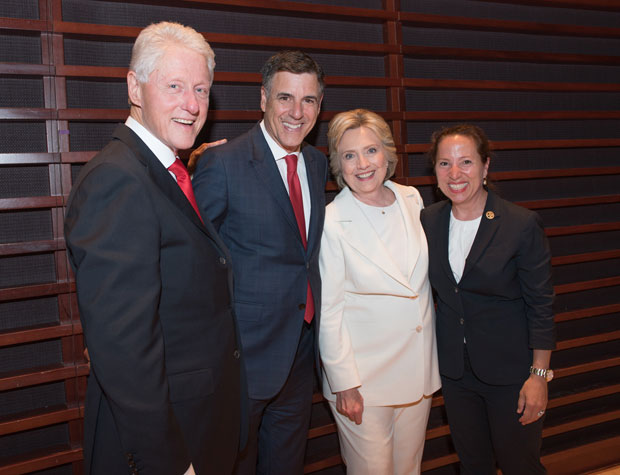Election 2016: The Greek-American Angle
by Endy Zemenides*
As the 2016 Presidential campaign season kicked off, Greek-Americans active in politics dreamed of impacting this election the way it affected the one in 2008. During that open seat election: the community divided its support among several candidates in the primaries; the major candidates for President – including then Senators Obama, Biden, Clinton and McCain – all addressed the PSEKA Conference; and significant “Greek-Americans for” committees with influential and recognizable surrogates were established across several campaigns.
A potential primary between Vice President Biden and Secretary of State Clinton – one that would have had major Greek-Americans in the Democratic Party lining up against one another – never materialized. Early Greek-American investments in the candidacies of Jeb Bush, Chris Christie and Scott Walker went for naught, as those campaigns fizzled early on. The chaos of the Republican primary and what appears to have been an assumption that the Trump candidacy was a flash in the pan led Greek-American Republicans to jump from one Trump alternative to another – engaging with Rubio, Cruz and Kasich as well – kept the community from building a real relationship or even a solid line of communication with the Trump campaign.
By the end of July the battle lines had been drawn and the question of whether Greek-Americans – with concentrations in key swing states like Florida, Ohio, Pennsylvania and New Hampshire – would rally to one candidate or another. Would the drama of the overall election have its counterpart in the community’s involvement?

George Gigicos (second from right) is one of the key Greek Americans in Donald Trump’s campaign. Here, with the candidate and members of his team
The Players
“Backing Hillary in this election is pretty close to a no-brainer from the community’s standpoint,” according to George Tsunis, CEO of Chartwell Hotels. Tsunis chaired the 2012 Greek-Americans from Obama-Biden efforts and along with Dennis Mehiel has led 2016 efforts on the East Coast on behalf of the Clinton campaign (in the interest of full disclosure the author has donated to those efforts). “Secretary Clinton has deep ties with the community. Many of our most active national donors are in New York, and she was our Senator. We dealt with her as Secretary of State on the Cyprus issue, the Ecumenical Patriarchate, the Macedonian issue and the Greek economic crisis.”
When asked to respond to the critique that Secretary Clinton hadn’t come through on Hellenic issues, Tsunis replied: “That is just not true. As much as we would like a U.S. President or Senator or Secretary of State to wave a magic wand and solve all Hellenic issues overnight, that’s not a proper way to evaluate someone’s record. Take a close look at Hillary’s involvement on Greek issues. As First Lady she visited the Ecumenical Patriarchate and that led to President Clinton’s visit to the Phanar. These trips really put the political spotlight on the plight of the Ecumenical Patriarchate and of Christians in Turkey. She continued this work as Secretary of State by visiting the Patriarchate again, by sending her Assistant Secretary of State to Halki, by hosting the Ecumenical Patriarch at the State Department and by intervening to help secure Turkish citizenship for Orthodox hierarchs – thereby ensuring the succession of the Ecumenical Patriarch.”
“This isn’t the only area in which Secretary Clinton has a track record and credibility with us,” continued Tsunis. “On Cyprus, the Clinton Administration and Richard Holbrooke – who before his passing was one of Hillary’s closest advisors – played an indispensable role in making sure that the Republic of Cyprus could get European Union membership even over Turkey’s objections. As Secretary of State, she supported – and made sure that then Turkish Foreign Minister Davutoglu understood U.S. support for – Cyprus’ rights to explore its EEZ for natural gas without interference or threat from Turkey. The ensuing discovery of hydrocarbons has changed the entire dynamic of the Cyprus problem and Cyprus’ role in the region as well. On the Macedonian name issue, her State Department reversed the Bush Administration’s policy of trying to secure NATO membership for FYROM over Greece’s objections and she made it clear that Skopje would only get into NATO when it came to terms with Athens.”

Ambassador Eleni Tsakopoulos Kounalakis with Hillary Clinton, Markos Kounalakis and Bill Clinton
The Clinton record on Hellenic issue was also praised by Andy Manatos, President of Manatos and Manatos and the National Coordinated Effort of Hellenes. According to Manatos, “A Hillary Clinton White House could be spectacular if it is anything like the Bill Clinton White House, in which Hillary played an important role. It moved forward on at least six separate Hellenic and Orthodox matters [Cyprus’ EU accession; a Presidential visit to the Ecumenical Patriarchate; a public apology for the US role in Greece’s junta; pressuring FYROM to remove irredentist claims from its constitution; getting Albania to release the “Omonia Five”; and resolving the Imia crisis] each of which no other White House could move.”
Tsunis and Eleni Tsakopoulos Kounalakis – who served as U.S. Ambassador to Hungary under Secretary Clinton, headed Greek-Americans for Clinton in 2008 and is a major bundler for Clinton again this year – also stressed the role of high level Clinton staffers, specifically John Podesta (Greek-American on his mother’s side) and her chief of policy, Jake Sullivan. “Jake was involved in keeping Turkey from interfering in Cyprus’ EEZ and was Vice President Biden’s National Security Advisor when he went to Cyprus,” said Tsunis. “You really can’t get someone more familiar with our issues in that position.”
It would be unfair to expect a similar track record of Donald Trump, who never served in government. Yet his Vice Presidential candidate, Indiana Governor Mike Pence, served in Congress and consistently earned low scores on AHEPA’s Congressional Scorecard. On his last Scorecard in Congress, Pence earned a 0% on pro-Hellenic legislation and an overall evaluation of only 20% from AHEPA. Pence’s most noteworthy “contribution” to Hellenic issues was vocally opposing U.S. participation in the Greek bailout.
On the positive side, as the anti-establishment candidate Trump has not been inculcated with the conventional wisdom of the American foreign policy establishment that holds Turkey in such high regard that there is no meaningful pressure on the Aegean, the Armenian Genocide, Cyprus or the Ecumenical Patriarchate. Washington has always preferred “quiet diplomacy” and it is hard to imagine anything “quiet” about a Trump Presidency.
We have also witnessed the emergence of new faces from the community that might have influence over a President Trump. Manatos points out “that one of Donald Trump’s earliest campaign staff people is the kind of Hellene who holds our issues extremely high on his own agenda. His name is George Gigicos. He worked in the George W. Bush White House along with my daughter-in-law Dana Manatos and her brothers Chris and Mark Edwards. George is a rare Hellene who is willing to spend his “chits” with a Trump White House assisting in our issues.”
In addition to Gigicos, RNC Chairman Reince Priebus – who is of German and Greek descent and is an Archon of the Ecumenical Patriarchate – has stood by Donald Trump throughout every controversy that had dinged the campaign. During the primaries, Trump described George Papadopoulos as a foreign policy advisor – although he has not emerged in any public role or even as a community surrogate during the general election.
Another new face to emerge has been Christos Marafatsos, President of Blue Sky Capital Management, who holds a seat on the National Diversity Coalition for Trump. Marafatsos believes that Greek-Americans will rally to Trump because he is “someone that favors hard work, equal opportunity, small business growth, Christianity, free markets, individual liberty and limited government, [all] characteristics promoted and valued by the Greek American culture and community.”

Republican Candidate for Vice President Mike Pence and family visiting Archbishop Demetrios
Measuring Support
While both campaigns could be expected to have vocal Greek American supporters, and debates on social media show a community divided between the two candidates, are there more telling signs of how the community is approaching the 2016 election?
In previous election cycles, Democratic bundlers and mega-donors were balanced (if not overwhelmed) by Republican counterparts. A review of Federal Election Commission records show that to not be the case this year. While the Clinton campaign features typical Democratic bundlers like Tsunis, Mehiel, and Tsakopoulos and the Greek-American community has hosted high profile and high dollar fundraisers with Secretary Clinton, John Podesta and Senator and Vice Presidential nominee Tim Kaine all attending, there have been no similar efforts on the Republican side. FEC records as of October show modest contributions to Trump by John Catsimatides, but also show greater contributions by a slew of Greek-American Republican donors to Trump’s primary opponents.
According to a top Republican operative in the Hellenic community who preferred to remain anonymous, “All of the communities pre-existing relationships were with other candidates. When Trump finally emerged as the nominee, the outreach to the community started too late, and it was undertaken by people whose role in the campaign was not exactly clear. It was not the ideal way to build a relationship.”
The Trump campaign seems to have missed some easy opportunities to build this relationship, starting with Congressman Tom Marino’s surrogate appearance on behalf of the Trump campaign at the PSEKA Conference in June 2016. The Congressman spoke at length about foreign policy issues, but failed to mention Hellenic issues. When pressed on the campaign’s stances on Cyprus and Greece, he incredibly answered that the campaign “hasn’t gotten to that yet.” Enough prominent Greek-American advocates consider Secretary Clinton as tepid on Turkey that more assertiveness by the Trump campaign on this front may have affected Greek-American support.

Christos Marafatsos, President of Blue Sky Capital Management, holds a seat on the National Diversity Coalition for Donald Trump
The lack of a preexisting relationship, a well-known and respected surrogate within the community, and the lack of direct outreach is reflected in polling. In a nationwide poll (940 respondents over 48 states) HALC conducted in October, 49.36% of Greek-Americans favor Hillary Clinton to 35.53% for Trump. In a previous poll in May, HALC found that 33.5% of Greek Americans preferred Trump, while 30.3% preferred Sanders and 27.2% preferred Clinton. Greek American independents were up for grabs at that point. Trump failed to reach out to them, and a month of controversy seems to have driven them decisively into the Clinton camp. When combined with a pre-convention poll undertaken by Greek Reporter (which showed a Clinton advantage of 45% – 41%), it is clear that 30% – 40% of Greek-American voters identify as independents, and their support could be influenced by clear stands on Hellenic issues (in all three polls, a super majority of Greek-Americans declared that their vote would be influenced by a candidate’s stances on Hellenic issues).
The Clinton campaign has been more open than Trump with the community – Secretary Clinton attended an event at Dennis Mehiel’s home in January 2016 and spoke directly on Hellenic issues; John Podesta conducted a national conference call (which also featured Governor Mike Dukakis and Ambassador Tsakopoulos Kounalakis) on which Cyprus, the Aegean and Greece were discussed; and it specifically discussed Hellenic issues via Tsakopoulos Kounalakis at the PSEKA Conference. Yet even Secretary Clinton’s team must have noticed the lack of engagement by Trump, because they have yet to release a position paper on Hellenic issues (as did the 2008 Obama-Biden campaign).

Hillary Clinton speaking at Dennis Mehiel’s house in January
Greek-American votes and donations are swinging decisively towards the Clinton campaign. Polling and the history of this community shows that this was not preordained. If Clinton is victorious, will her team realize that Greek-Americans cannot be taken for granted and more should be done to consolidate this support? On the other hand, will the Republican party ever at the national level realize that it can make inroads with the community – just as several Republican members of the House of Representatives have – by building a positive record on Hellenic issues? The 2016 election hasn’t been held yet, but it may be time for the community to have a new strategy for 2018 and 2020.
Endy Zemenides is the Executive Director of the Hellenic American Leadership Council (HALC), a national advocacy organization for the Greek American community. He is also a frequent contributor to NEO magazine. To learn more about HALC, visit hellenicleaders.com















0 comments